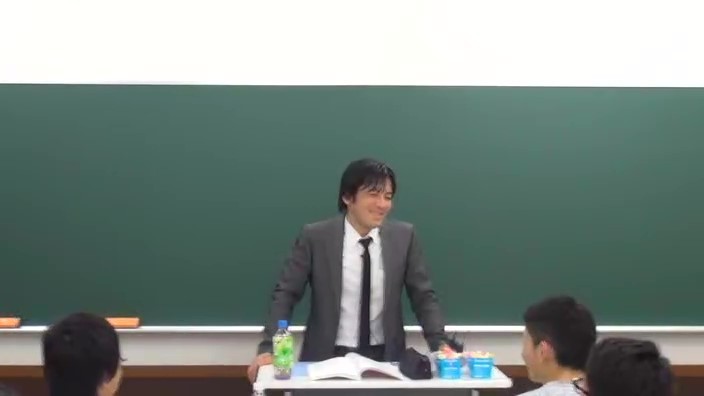英文法5分ドリル【準動詞】形容詞的用法 ②
“Grandpa says he’s going to give us a surprise.”
“Oh, really, what ( ) it be?”
① shall
② can
③ must
④ need
疑問文中で「一体 ~ だろうか」という強い疑問を表す用法。
正解:②
「おじいちゃんがプレゼントをくれると言っていた」
「え, ほんとに!いったい何かなあ」
“Grandpa says he’s going to give us a surprise.”
“Oh, really, what can it be?”
Grandpa hints at a surprise coming our way.
"I wonder what Grandpa's surprise will be."
can:
潜在力 ▸「可能性」「能力」「許可」
⑴ 能力
Computers can do a lot of things.
コンピュータはいろいろなことができる
⑵ 可能性
Children can be very cruel sometimes.
子供はときどき残酷なことをすることがある
⑶ 疑念
Can his story be true?
一体彼の話は本当だろうか
⑷ (否定文で) 否定的推量
It can't be true.
それは本当であるはずがない
⑸ 許可
You can use my dictionaries.
私の辞書を使ってもいいですよ
⑹ 軽い命令
You can go now.
行ってよいです。
His appearance has changed so much that you ( ) well not recognize him.
① may
② ought
③ shall
④ will
may well ~
⑴「おそらく ~ だろう」
⑵「 ~ はもっともだ」(=have good [every] reason to do)
正解:①
「彼の外見はすごく変わったのでたぶん君は彼のことをわからないだろう」
His appearance has changed so much that you may well not recognize him.
His transformation is so drastic that he might go unnoticed.
"He's changed so much; you might not recognize him."
The door ( ) open. It must be locked inside.
① shall not
② cannot
③ will not
④ dare not
主語の拒絶を表すwill not は無生物主語でも用いられる。
正解:③
「ドアはびくともしない.内側から鍵がかかっているに違いない」
The door will not open. It must be locked inside.
The door's refusal to budge suggests it's locked from within.
"It seems like the door is locked from the inside."
It is necessary that every member ( ) inform himself of the rules of the club as soon as possible.
① would
② might
③ should
④ could
It is+要求・必要・願望の形容詞+[that S’ (should) do…]
アメリカ英語では should が出現しない。
should は訳出しない
正解:③
「全てのメンバーができるだけ早くクラブの規則を知ることが必要だ」
It is necessary that every member should inform himself of the rules of the club as soon as possible.
It's imperative for each member to familiarize themselves with the club's rules promptly.
"Every member needs to know the club rules as soon as possible."
The train will be leaving in five minutes, so you ( ) better hurry up.
① had
② should
③ could
④ might
had betterは助動詞と考えてよく, 後には原形が来る.
否定形は<had better not go>
had not better go の形は存在しない。
正解:①
「あと5分で列車が発車するよ。急いで!」
The train will be leaving in five minutes, so you had better hurry up.
The imminent departure of the train demands swift action from you.
"You should hurry; the train leaves in five minutes."
I ought ( ) the lecture but I didn’t.
① attend
② have attended
③ to attend
④ to have attended
ought to have done 「 ~ するべきだったのに(実際はしなかった)」(=should have done)
attend「出席する」
ought to have doneには「当然~しているはず」の意もある。
正解:④
「レクチャーに出席するべきだったのにしなかった」
I ought to have attended the lecture but I didn’t.
I should have made it to the lecture, but I didn't.
"I was supposed to attend the lecture, but I missed it."
She doesn’t talk much, but once she ( ) speak she is eloquent.
① will
② shall
③ does
④ did
once 〈接〉「ひとたび ~ すると」
eloquent「雄弁な」
doesは動詞強調の助動詞で強く発音される.
I did return the book to the self.
=I really returned the book to the self.
「間違いなく,その本は棚に返しました」
正解:③
「彼女は(普段)無口だけど, いったん話し出すとおしゃべりだ」
She doesn’t talk much, but once she does speak she is eloquent.
While she's usually quiet, her words carry eloquence once spoken.
"She's not very talkative, but when she speaks, she's eloquent."
His plan ( ) be abandoned.
① doesn’t ought to
② ought not to
③ ought to not
④ not ought to
〔否定形〕 He ought not (to) do ~ .
〔疑問形〕 Ought he (to) do ~ ?
正解:②
「彼の計画は中止すべきでない」
His plan ought not to be abandoned.
His plan should not be discarded.
"We shouldn't give up on his plan."
How dare you ( ) to me like that!
① speak
② to speak
③ speaking
④ spoken
dare 「あえて ~ する」は needと同様に,
動詞と助動詞の2用法がある。
ここでは助動詞。
疑問文中の dare は
How dare you do … ?
「どうして ~ をあえてするのか」
→「よくも ~ することができるものだ」
という意味で,反語的疑問文の場合が多い。
正解:①
「よくも私にそんな口のきき方ができるものだ」
How dare you speak to me like that!
How can you speak to me in such a disrespectful manner?
"I can't believe you'd talk to me like that!"
Young Americans with only a high school education earn less than they ( ) ten years ago.
① were
② gave
③ did
④ used
代動詞の did = earned
前出の動詞または述部の反復を避ける表現。
正解:③
「今のアメリカの高卒の若者は10年前に比べて収入が少ない」
Young Americans with only a high school education earn less than they did ten years ago.
High school-educated young Americans earn less now than a decade ago.
"Young Americans with only a high school education make less money than they did ten years ago."
A: I just called her home. She left over an hour ago.
B: Well, she ( ) got here by now, then.
① ought to be
② should have been
③ should have
④ can have
should have done「~ しているはずだ」
過去の行為や状態に対する現在の推量を表す表現。
正解:③
A:彼女に今電話したところだけど1時間以上前に家を
出たのだって
B:それじゃ,もうここについているはずですね
A: I just called her home. She left over an hour ago.
B: Well, she should have got here by now, then.
A: She left more than an hour ago when I called.
B: She should have arrived by now.
This electric machine did not function properly when it was delivered to my house. It ( ) broken during shipping.
① can have
② could be
③ has to be
④ must have been
must have done「~ したに違いない」
現在の視点から過去の事柄に対する断定的推量を表す表現。
deliver「配達する」
function「機能を果たす」
properly「適切に」
正解:④
「家に届いた時この電子機械は正しく動かなかった。運送中に壊れたにちがいない」
This electric machine did not function properly when it was delivered to my house. It must have been broken during shipping.
This electric machine malfunctioned upon delivery, likely damaged during shipping.
"It seems like it was broken during shipping."
must:
圧力;BE NECESSARY
⑴ 義務
You must keep silence in the library.
図書館では私語は慎まなければならない。
⑵ 推量
She must be sick.
彼女は病気に違いない。
★英作文で must と have to 混合に注意
☆ must ➪ 意志を表すwillにやや 感情が入り込んだもの
☆ have to ➪ 状況によってせざるを得ないので これからすること
☆ had to ➪状況によってせざるを得なかったので 実際にしたこと
成句:have only to ~「~しさえすればよい」
You have only to try hard.
=All you have to do is (to) try hard.
あなたは一生懸命がんばるだけでいい
“He must have stolen it.”
“No. He is a very honest boy. He ( ) it.”
① must not steal
② must not have stolen
③ cannot have stolen
④ should not have stolen
cannot have done「 ~ したはずがない」
現在の視点から過去の出来事に対する否定の推量を表す表現。
②.must not have done は存在しない形。
honest「正直な」
正解:③
「彼が盗んだに違いない」
「いいや,彼はとても正直な子だよ。彼が盗むはずがない」
“He must have stolen it.”
“No. He is a very honest boy. He cannot have stolen it.”
"He might have stolen it."
"No, he's an honest boy. He couldn't have taken it."
Someone ( ) in the room, because the door was left unlocked.
① must have been
② should have been
③ must not be
④ ought not to be
must have done 「 ~ したにちがいない」
leave O C 「 ~ を … の状態にしておく」
left the door unlooked. → the door was left unlooked
V O C 〔受身〕
正解:①
「誰かが部屋にいたに違いない。なぜなら鍵がかけられていなかったから」
Someone must have been in the room, because the door was left unlocked.
It appears someone accessed the room; the door was left unlocked.
"The door was unlocked; someone must have been in the room."
“I feel terribly ill today.” “You ( ) so hard yesterday.”
① didn’t work
② shouldn’t work
③ wouldn’t work
④ didn’t need to work
needは疑問文・否定文で助動詞として使うことが出来る。
☆〔動 詞〕 Do you need to do ~ ?
You don’t need to do ~ .
☆〔助動詞〕 Need you do ~ ?
You need not do ~ .
正解:④
“今日はかなり体調が悪いです”
“昨日あんなに働かなくてもよかったのに”
“I feel terribly ill today.”
“You didn’t need to work so hard yesterday.”
"I'm feeling terribly sick today."
"You shouldn't have overworked yourself yesterday."
【音読基本英文】

「おじいちゃんがプレゼントをくれると言っていた」
「え, ほんとに!いったい何かなあ」
“Grandpa says he’s going to give us a surprise.”
“Oh, really, what can it be?”
Grandpa hints at a surprise coming our way.
"I wonder what Grandpa's surprise will be."
「彼の外見はすごく変わったのでたぶん君は彼のことをわからないだろう」
His appearance has changed so much that you may well not recognize him.
His transformation is so drastic that he might go unnoticed.
"He's changed so much; you might not recognize him."
「ドアはびくともしない.内側から鍵がかかっているに違いない」
The door will not open. It must be locked inside.
The door's refusal to budge suggests it's locked from within.
"It seems like the door is locked from the inside."
「全てのメンバーができるだけ早くクラブの規則を知ることが必要だ」
It is necessary that every member should inform himself of the rules of the club as soon as possible.
It's imperative for each member to familiarize themselves with the club's rules promptly.
"Every member needs to know the club rules as soon as possible."
「あと5分で列車が発車するよ。急いで!」
The train will be leaving in five minutes, so you had better hurry up.
The imminent departure of the train demands swift action from you.
"You should hurry; the train leaves in five minutes."
「レクチャーに出席するべきだったのにしなかった」
I ought to have attended the lecture but I didn’t.
I should have made it to the lecture, but I didn't.
"I was supposed to attend the lecture, but I missed it."
「彼女は(普段)無口だけど, いったん話し出すとおしゃべりだ」
She doesn’t talk much, but once she does speak she is eloquent.
While she's usually quiet, her words carry eloquence once spoken.
"She's not very talkative, but when she speaks, she's eloquent."
「彼の計画は中止すべきでない」
His plan ought not to be abandoned.
His plan should not be discarded.
"We shouldn't give up on his plan."
「よくも私にそんな口のきき方ができるものだ」
How dare you speak to me like that!
How can you speak to me in such a disrespectful manner?
"I can't believe you'd talk to me like that!"
「今のアメリカの高卒の若者は10年前に比べて収入が少ない」
Young Americans with only a high school education earn less than they did ten years ago.
High school-educated young Americans earn less now than a decade ago.
"Young Americans with only a high school education make less money than they did ten years ago."
A:彼女に今電話したところだけど1時間以上前に家を
出たのだって
B:それじゃ,もうここについているはずですね
A: I just called her home. She left over an hour ago.
B: Well, she should have got here by now, then.
A: She left more than an hour ago when I called.
B: She should have arrived by now.
「家に届いた時この電子機械は正しく動かなかった。運送中に壊れたにちがいない」
This electric machine did not function properly when it was delivered to my house. It must have been broken during shipping.
This electric machine malfunctioned upon delivery, likely damaged during shipping.
"It seems like it was broken during shipping."
「彼が盗んだに違いない」
「いいや,彼はとても正直な子だよ。彼が盗むはずがない」
“He must have stolen it.”
“No. He is a very honest boy. He cannot have stolen it.”
"He might have stolen it."
"No, he's an honest boy. He couldn't have taken it."
「誰かが部屋にいたに違いない。なぜなら鍵がかけられていなかったから」
Someone must have been in the room, because the door was left unlocked.
It appears someone accessed the room; the door was left unlocked.
"The door was unlocked; someone must have been in the room."
“今日はかなり体調が悪いです”
“昨日あんなに働かなくてもよかったのに”
“I feel terribly ill today.”
“You didn’t need to work so hard yesterday.”
"I'm feeling terribly sick today."
"You shouldn't have overworked yourself yesterday."
今後も英語に関する情報を発信していきます。









